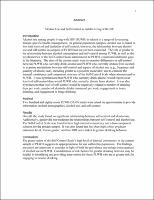Please use this identifier to cite or link to this item:
https://hdl.handle.net/20.500.12202/7088| Title: | Alcohol use and self-control in adults living with HIV |
| Authors: | Shuter, Jonathan Coletti, Daniel J. Foley, Frederick W. Swencionis, Charles Kashan, Rachel |
| Keywords: | clinical psychology psychology alcohol use HIV self-control |
| Issue Date: | Jul-2021 |
| Citation: | Kashan, R. (2021, July). Alcohol use and self-control in adults living with HIV, (Publication No. 28718185) [Doctoral dissertation, Yeshiva University]. ProQuest Dissertations and Theses Global. |
| Abstract: | Abstract Introduction Alcohol use among people living with HIV (PLWH) is related to a range of devastating disease-specific health consequences. In general population samples, alcohol use is linked to low trait levels of and depletion of self-control; however, the relationship between alcohol use and self-control in samples of PLWH had not yet been examined. The role of gender in the relationship between alcohol consumption and self-control among PLWH, as well as the psychometrics of the Self-Control Scale administered to PLWH, constituted additional gaps in the literature. The aims of the current study were to examine differences in self-control between PLWH who currently drink alcohol and PLWH who currently abstain from alcohol; to examine associations between self-control and aspects of alcohol use (e.g., frequency and quantity of alcohol use), including gender as a possible moderator; and to examine the internal consistency and component structure of the Self-Control Scale when administered to PLWH. It was hypothesized that PLWH who currently drink alcohol would report lower levels of self-control than would PLWH who currently abstain from alcohol. It was also hypothesized that level of self-control would be negatively related to number of drinking days per week, number of alcoholic drinks consumed per week, engagement in heavy drinking, and engagement in binge drinking. Method Two hundred and eighty-seven PLWH (55.4% male) were asked via questionnaire to provide information on their demographics, alcohol use, and self-control. Results Overall, the study found no significant relationship between self-control and alcohol use. Additionally, gender did not moderate the relationships between self-control and alcohol use. The Self-Control Scale was found to have high internal consistency and a two-component solution for the present sample. It was also found that less than high school graduate education level, female gender, and low BMI were linked to greater drinking behavior. Conclusions The preservation of the Self-Control Scale’s high level of internal consistency in the current sample of PLWH suggests its appropriateness for use within this population. The findings presented are important to consider in light of both the prevalence and unique consequences of alcohol use in PLWH. Consideration of risk factors for greater drinking behavior may be helpful in identifying and providing intervention for those PLWH who are at greater risk for engaging in heavier drinking. |
| Description: | Doctoral dissertation, PhD, Ferkauf |
| URI: | https://hdl.handle.net/20.500.12202/7088 https://ezproxy.yu.edu/login?url=https://www.proquest.com/dissertations-theses/alcohol-use-self-control-adults-living-with-hiv/docview/2572600011/se-2?accountid=15178 |
| Appears in Collections: | Ferkauf Graduate School of Psychology: Doctoral Dissertations |
Files in This Item:
| File | Description | Size | Format | |
|---|---|---|---|---|
| Kashan_Dissertation Full Document_8.5.2021_FINAL ETD.pdf | 885.68 kB | Adobe PDF |  View/Open |
This item is licensed under a Creative Commons License

